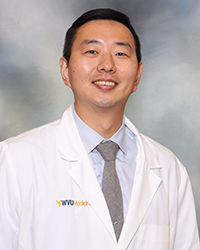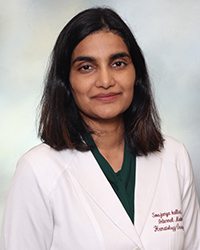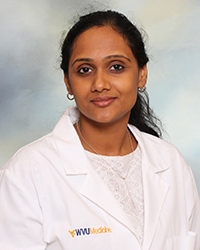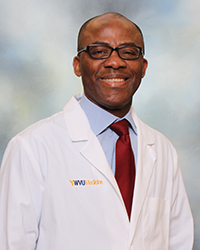WVU Cancer Institute at Berkeley Medical Center
The Best in Cancer Treatment Close to Home
As part of the WVU Cancer Institute, the Regional Cancer Center in Martinsburg provides cancer care in the Eastern Panhandle of West Virginia. Our cancer program, based at Berkeley Medical Center, has been accredited by the American College of Surgeons Commission on Cancer since 1992 and is a recipient of their outstanding achievement award.
We are proud to be among the 30% of hospitals in the country with an ACOS accredited cancer program.
A Collaborative Team
We proudly work as an interdisciplinary team to provide all modalities of cancer treatment. Our diverse team of Hematologist/Oncologists work closely with general surgery, surgical oncology, and radiation oncology to ensure our patients receive treatment that meets and exceeds nationally recognized treatment standards.
Each week, we hosts an interdisciplinary Tumor Board, a collaborative meeting attended by medical oncology, surgical specialties, radiation oncology, diagnostic radiology, pathology, primary care and other specialty physicians involved in the patients’ care. The meeting is also attended by our clinical research nurse, nurse navigators, and cancer program leadership, ensuring timely initiation of recommended treatments
Appointments and Location
For more information or to speak with a Nurse Navigator, please call 304-267-1944.
WVU Regional Cancer and Infusion Center, a department of Berkeley Medical Center, is located in the Dorothy McCormack Center on the Berkeley Medical Center campus.
2000 Foundation Way, Suite 2600
Martinsburg, WV 25401
Phone: 304-267-1944
Treatments and Services
The Medical Oncology department is dedicated to providing individualized care for each patient based on their needs. Our Medical Oncologists are specially trained to diagnose and treat cancer with chemotherapy and other medications. We use chemotherapy, biologic and targeted therapies to treat a range of cancer diagnoses. The team works closely with healthcare specialists from other departments, including surgery and radiation oncology to provide you with comprehensive cancer treatment.
We work closely with our partners at the WVU Cancer Institute to provide additional treatments which may not be readily available at regional medical centers. Our collaboration with WVU allows us to offer our patients a full complement of treatments starting with diagnosis and ranging through treatment and survivorship.
Our Physicians are also specially trained to diagnose and treat hematologic conditions, also called blood disorders. Blood disorders can be malignant- including leukemia, myeloma and lymphoma or they can be benign. We treat a variety of blood disease including, but not limited to anemias, bleeding and clotting disorders, white blood cell disorders, polycythemia, iron overload and monoclonal gammopathy.
WVU Medicine Berkeley Medical Center Radiation Oncology is conveniently located in the Dorothy McCormack Center. Radiation Oncologist use radiation treatments (also referred to as radiation therapy) to kill cancer cells and shrink tumors. The radiation energy injures or destroys cells in the target tissue, making it impossible for these cells to continue to grow and divide.
Radiation therapy may be used to treat many types of tumors, including cancers of the brain, breast, cervix, head and neck, lung, prostate, skin, stomach and uterus.
Radiation therapy may be used alone or in combination with other cancer treatments, such as chemotherapy or surgery. In some cases, a person may receive more than one type of radiation therapy. Radiation therapy may also be offered as a palliative treatment, to help alleviate symptoms of metastatic cancer.
Services include:
- EBRT (external beam radiation therapy)
- IMRT (intensity modulated radiation therapy)
- IGRT (image-guided radiation therapy)
- LDR brachytherapy
- HDR brachytherapy
- 3D-Conformed radiation therapy
- SBRT (stereotactic body radiotherapy)
For more information, contact:
The Surgical Oncology team works closely with our medical oncologists and radiation oncologist to create an individualized care plan for each patient. Using state-of-the-art technology, our surgeons specialize in minimally invasive and robotic surgery procedures that result in better outcomes and quicker recoveries. Our surgeons have extensive clinical experience in treating a variety of cancers including breast, pancreatic, and colon, along with a broad understanding of the latest cancer treatment modalities.
We are proud to collaborate with the WVU Cancer Institute in Morgantown to provide comprehensive cancer services to patients in the Eastern Panhandle. If a specialty service or procedure is not available locally, patients may be referred to the Morgantown location to receive treatment from their team of industry-leading oncologists.
The Lung Nodule Program at the WVU Cancer Institute Regional Cancer Center in Martinsburg provides a plan of care for patients found to have lung masses or nodules that may indicate cancer. The Lung Nodule Program features a multidisciplinary team of providers from primary care, radiology, interventional radiology, pulmonology, thoracic surgery and medical and radiation oncology. Led by pulmonology and our dedicated Nurse Navigator, the team works together to review cases and create individualized plans of care spanning across multiple specialties. When diagnosing cancer, timeliness and ease of access to diagnostic procedures is of the utmost importance. This team was founded to ensure our patients receive the highest quality treatment without experiencing delay or barriers to care.
For more information about the Lung Nodule Program or to refer a patient, Contact our Nurse Navigator: 304-596-2861.
WVU Cancer Institute partners with the WVU Heart and Vascular Institute in Martinsburg to provide Thoracic Oncology services to our lung and esophageal cancer population. Ghulam Abbas, M.D., M.H.C.M., F.A.C.S., uses the most advanced equipment and latest surgical techniques, including minimally-invasive robotic surgery and video-assisted thoracic surgery, to achieve the best possible patient outcomes. The WVU Heart and Vascular Institute Division of Thoracic Surgery has earned a distinguished three-star (highest) rating from The Society of Thoracic Surgeons for esophageal cancer patient care and robotic esophagostomy outcomes. For more information, visit Berkeley Medical Center Thoracic Surgery.
The Cancer and Infusion Center
Our newly-renovated Cancer and Infusion Center is located in the Dorothy McCormick Center at Berkeley Medical Center. Our facility allows for patients to see their Oncologist and receive treatment in one convenient location.
Cancer and infusion therapies are administered by highly-trained registered nurses. In order to administer chemotherapy, our nurses are required to maintain the Oncology Nurse Society Chemotherapy/Immunotherapy Certification. Our staff follow standards as set forth by the American Society of Clinical Oncology, the Oncology Nurse Society, and the U.S. Pharmacopeial Convention to maintain the highest level of safety for our patient and team members.
Our Cancer and Infusion Center includes:
- 21 treatment chairs, including private and semi-private areas.
- 12 physician exam rooms.
- An onsite pharmacy for quick preparation of chemotherapy and infusions.
- An onsite lab, allowing for rapid results critical to oncology.
- A dedicated, tranquil space for counseling and education.
- Ample waiting room space to accommodate patients and their families.
Inpatient Oncology
Some cancer treatment procedures require you to be admitted to the hospital, or you may experience symptoms that cannot be managed at home. If you are admitted to the hospital, another name for this is inpatient.
Our inpatient oncology unit is located on the 6th floor of Berkeley Medical Center. This 8 bed unit is home to a compassionate team of registered nurses and patient care technicians who provide specialized care to oncology and palliative care patients. Inpatient oncology nurses maintain the Oncology Nurse Society Chemotherapy/Immunotherapy Certifications.
Information for Patients
You can help us to help you better by providing us with all necessary documents.
Before your first scheduled appointment, please provide all necessary medical records, radiology films and pathology slides from outside facilities. Send them at least three business days before your first appointment so our doctors have time to review this information.
What to bring with you:
- Insurance card(s)
- Prescription coverage card
- A photo ID
- Emergency contact information, please note: this must be different than your contact information
- Current medication list
- Any medications you are scheduled to take during your visit, including pain medication. (We do not keep medication in our pharmacy to manage pain, so please bring these prescriptions with you in their original bottle, and let your nurse know when you are planning to take them.)
- List of any questions for doctor or nurse
- A copy of your advance directive/medical power of attorney
- Medical history form
- Completed New Patient Forms
Visitation Guidelines may vary due to the COVID-19 pandemic. Please contact us for more information prior to your appointment.
- Only patients are allowed in the lab draw, triage and small treatment areas. We ask for all visitors to wait in the lobby.
- Visitors to the infusion area are limited to 2 adults at a time. We ask that additional visitors wait in the lobby.
- For safety reasons, we do not allow children under the age of 12 into the treatment area. Children under the age of 12 can wait in the lobby with appropriate adult supervision.
- Treatment chairs are for patients only. We ask that visitors not sit in the treatment chairs.
- We encourage patients and visitors to bring reading or other materials to help occupy time while you receiving your treatment or waiting for test results.
Chemotherapy side effects can happen at any hour of the day, and you may need to contact a physician on your team to help manage. In order to assure your safety after hours, we ask that you follow the following procedure:
To Contact an Oncologist After Hours:
- Call Berkeley Medical Center at (304) 264- 1000
- Press 0 to get to the Operator
- Ask the Operator to have the Oncologist on call contact you at the phone number you provide.
- If this call is an emergency, do not wait, call 911 and/or go to the nearest Emergency Room. Emergencies include:
- A temperature of 100.4 or greater
- Bleeding that you are unable to stop after applying pressure
- Chest pain
- Shortness of breath
It is our goal to complete prescription refills as quickly as possible. Prescription refills may not available outside of regular business hours, including weekends and holidays so please be sure to provide 72 hours’ notice for prescription requests. You may request prescriptions by:
- Contacting your pharmacy- you may notify your pharmacy of your refill needs, and they will contact us through our electronic medical record system.
- Let your physician know which medications you need refilled at the time of your scheduled visit
- You may call or prescription refill line at (304) 267-1944, Option 4.
- Please provide your first and last name, date of birth, preferred pharmacy and a call back number along with medication(s) being requested.
Not only will you receive world-class care from our physician team, you will also be provided with a range of services provided by our supportive staff to receive the best comprehensive care, close to home.
Patient Navigation
Each oncology patient is assigned a Nurse Navigator to help guide you through the cancer journey. Your Nurse Navigator will be your main point on contact from diagnosis through survivorship, and works closely with our providers to ensure you are receiving timely, streamlined care.
Social Worker Support
The Cancer Center offers the support of a Licensed Social Worker. Our social worker collaborates closely with our Nurse Navigators, Physicians and Infusion Center Staff to break down barriers to care. Services provided include, but are not limited to: financial assistance, assistance with transportation, discussions regarding advanced care planning, and supporting home health and hospice needs.
A Dedicated Triage Nurse
Our Support Team includes a Registered Nurse dedicated to answering questions and assisting patients through side effects of cancer and treatment. Through effective symptom management, we strive to keep patients out of the hospital and managing in the comfort of their home.
Nutritional Support
Our Registered Dietitian is available by appointment to provide education to our oncology patients. She works closely with staff to identify patients in need of extra support through their cancer journey.
Prior Authorization and Scheduling
Our Prior Authorization and Scheduling staff work to ensure your treatments are covered by insurance and offer suggestions, in collaboration with Social Work to help lessen the financial burden that can come along with receiving treatment.
Chemotherapy Orientation – This presentation is provided by our nurse navigators to all patients starting chemotherapy. It may be helpful to review these slides to help you come up with questions to ask your doctor or nurses.
We encourage you to learn and research if you are interested in furthering your understanding about cancer. It is important to ensure information you find on the internet is up-to-date, accurate, and supported by the medical community. Please consider the following websites.
American Cancer Society: https://www.cancer.org/
Doctor- Approved Patient Information from ASCO: https://www.cancer.net/
National Cancer Institute: https://www.cancer.gov/
National Comprehensive Cancer Network, Patient and Caregiver Resources: https://www.nccn.org/patients/resources/default.aspx
Leukemia and Lymphoma Society: https://www.lls.org/
Cancer Care: https://www.cancercare.org/
Chemocare: http://chemocare.com/
Understanding Clinical Trials
The WVU Cancer Institute Regional Cancer Center participates in select clinical trials here in Martinsburg, WV. Our clinical research nurse works closely with our physician team to screen all new oncology patients, determining what clinical trials may be appropriate for them. The Regional Cancer Institute also collaborates with WVU Cancer Institute in Morgantown, WV to provide access to clinical trials conducted by the state’s primary research institute.
For a complete list of clinical research trials available with WVU Cancer Institute’s Clinical Research Unit, please visit WVU Cancer Institute’s current clinical trials.
Clinical trials are research studies conducted with patients. They focus on either the prevention or treatment of diseases. Prevention trials recruit healthy people to study agents that have the potential of stopping disease before it ever starts. Treatment trials target people suffering from specific diseases to test the effectiveness of new medications, compare standard treatments with new ones, or test at a combination of medications and other treatments, such as surgery or radiation.
West Virginia University and the West Virginia University Cancer Institute are recognized nationally as clinical trials sites. Our cancer research is particularly focused on the types of cancers most common in West Virginia. Those are lung, breast, prostate, and colon/rectal cancers. We are always interested in recruiting new participants for one of the many clinical trials being offered.
Risks and side effects exist with any medical treatment, whether it is a standard treatment or a clinical trial. Our trials have many safeguards to protect the health and safety of our patients.
- Treatments are carefully studied in laboratories before they are used with patients.
- Any research involving patients must be approved by the Institutional Review Board (IRB). The IRB is made up of doctors, administrators, ethics specialists, and members of the general public. The IRB reviews every clinical trial to protect the rights and welfare of the patients.
- Patients considering a clinical trial receive verbal and written information about the trial, including information about any known risks or side effects.
- Patients must sign a consent form before entering a trial.
- Patients have the right to stop participating in a trial at any time.
- Patients are carefully monitored by exams, blood tests, x-rays, and phone calls. This means that any changes in a patient’s condition are promptly detected and examined.
- Data on a patient’s condition are constantly checked by the clinical trial sponsor.
- Patients are informed of new information that emerges during a clinical trial, such as when data accumulate about adverse effects or new, more convenient dosing schedules.
Do any of these statements describe you?
- I am looking for the most current treatments for my condition
- I have tried all of the current suggested treatments for my condition
- I want to help find cancer answers
- I want to help myself and others
If one or more of these statements sounds like you — and you meet all of the eligibility requirements — then you could be the type of person who participates in a clinical trial at WVU.
Cancer Screening
At the WVU Cancer Institute Regional Cancer Center, we dedicate ourselves to not only treating cancer, but to helping educate our community on the importance of appropriate cancer screening. We follow guidelines supported by the American Cancer Society, and make the following recommendations:
- Women ages 40 to 44 should have the choice to start annual breast cancer screening with mammograms (x-rays of the breast) if they wish to do so.
- Women age 45 to 54 should get mammograms every year.
- Women 55 and older should switch to mammograms every 2 years, or can continue yearly screening.
- Screening should continue as long as a woman is in good health and is expected to live 10 more years or longer.
- All women should be familiar with the known benefits, limitations, and potential harms linked to breast cancer screening.
Women should also know how their breasts normally look and feel and report any breast changes to a health care provider right away.
Some women – because of their family history, a genetic tendency, or certain other factors – should be screened with MRIs along with mammograms. (The number of women who fall into this category is very small.) Talk with a health care provider about your risk for breast cancer and the best screening plan for you.
Please visit our mammography website for more information and scheduling.
For people at average risk for colorectal cancer, the American Cancer Society recommends starting regular screening at age 45. This can be done either with a sensitive test that looks for signs of cancer in a person’s stool (a stool-based test), or with an exam that looks at the colon and rectum (a visual exam). Talk to your health care provider about which tests might be good options for you, and to your insurance provider about your coverage. No matter which test you choose, the most important thing is to get screened.
If you’re in good health, you should continue regular screening through age 75.
For people ages 76 through 85, talk with your health care provider about whether continuing to get screened is right for you. When deciding, take into account your own preferences, overall health, and past screening history.
People over 85 should no longer get colorectal cancer screening.
If you choose to be screened with a test other than colonoscopy, any abnormal test result needs to be followed up with a colonoscopy.
Please visit the American Cancer Society for more information about colon cancer screening tests.
- Cervical cancer screening should start at age 25. People under age 25 should not be tested because cervical cancer is rare in this age group.
- People between the ages of 25 and 65 should get a primary HPV (human papillomavirus) test* done every 5 years. If a primary HPV test is not available, a co-test (an HPV test with a Pap test) every 5 years or a Pap test every 3 years are still good options.
(*A primary HPV test is an HPV test that is done by itself for screening. The US Food and Drug Administration has approved certain tests to be primary HPV tests.)
The most important thing to remember is to get screened regularly, no matter which test you get.
· People over age 65 who have had regular cervical cancer testing in the past 10 years with normal results should not be tested for cervical cancer. Once testing is stopped, it should not be started again. Those with a history of a serious cervical pre-cancer should continue to be tested for at least 25 years after that diagnosis, even if testing goes past age 65.
· People whose cervix has been removed by surgery for reasons not related to cervical cancer or serious pre-cancer should not be tested.
· People who have been vaccinated against HPV should still follow the screening recommendations for their age groups.
Some individuals – because of their health history (HIV infection, organ transplant, DES exposure, etc.) – may need a different screening schedule for cervical cancer. Talk to a health care provider about your history.
Visit the American Cancer Society for more information about HPV Vaccines.
The American Cancer Society recommends that at the time of menopause, all women should be told about the risks and symptoms of endometrial cancer. Women should report any unexpected vaginal bleeding or spotting to their doctors.
Some women – because of their history – may need to consider having a yearly endometrial biopsy. Please talk with a health care provider about your history.
The American Cancer Society recommends yearly lung cancer screening with a low-dose CT scan (LDCT) for certain people at higher risk for lung cancer who meet the following conditions:
- Are aged 55 to 74 years and in fairly good health and
- Currently smoke or have quit smoking in the past 15 years and
- Have at least a 30 pack-year smoking history. (A pack-year is 1 pack of cigarettes per day per year. One pack per day for 30 years or 2 packs per day for 15 years would both be 30 pack-years.)
Before getting screened, you should talk to your health care provider about:
- Your risk for lung cancer
- How you can quit smoking, if you still smoke
- The possible benefits, limits, and harms of lung cancer screening
- Where you can get screened
Visit our Lung Cancer Screening Program website for more information or to schedule a screening.
The American Cancer Society recommends that men make an informed decision with a health care provider about whether to be tested for prostate cancer. Research has not yet proven that the potential benefits of testing outweigh the harms of testing and treatment. We believe that men should not be tested without first learning about what we know and don’t know about the risks and possible benefits of testing and treatment.
Starting at age 50, men should talk to a health care provider about the pros and cons of testing so they can decide if testing is the right choice for them.
If you are African American or have a father or brother who had prostate cancer before age 65, you should have this talk with a health care provider starting at age 45.
If you decide to be tested, you should get a PSA blood test with or without a rectal exam. How often you’re tested will depend on your PSA level.





